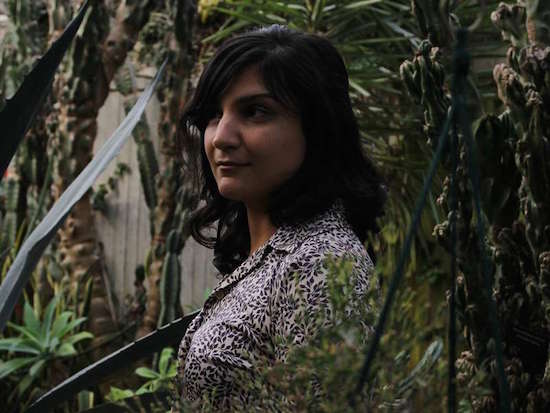"I feel like a lot of people were just like, ‘I can’t do anything’," Sarah Davachi says to me over a Skype line from her home base of Los Angeles as we begin to discuss how the COVID-19 pandemic and associated lockdown has impacted her work this year. "Other people were working obsessively on things, and I think I sat on both sides of that spectrum at different points."
If the pandemic has stymied Davachi’s release plans for 2020, you certainly wouldn’t know it looking over the music she’s put out this year. In March and April, she recorded a pair of EPs – Horae (using the Korg PS-3100) and Five Cadences (using the Mellotron) – from her home, releasing them digitally via her Bandcamp page as part of the platform’s monthly fee-waive days. In May, a cassette for Boomkat Editions’ Documenting Sound series, in which artists are invited to share spontaneous works produced in their homes or immediate surroundings amid the pandemic, arrived in the form of Gathers, a striking collection of sketches produced using harpsichord, piano, harmonium, Mellotron, electric organ and Davachi’s trusty EMS Synthi AKS synth.
Her final two releases for 2020 – a double album, Cantus, Descant, and an accompanying live album, Figures In Open Air – mark the launch of her own Late Music imprint, set up as a subsidiary of Warp Records. The idea of starting her own label emerged from discussions between Davachi and her manager. "I’ve always sort of jumped around from label to label, and that’s often good because you can reach different demographics of people and find different audiences who are tethered to each label," she says. "But we both thought that it would make sense for me to have my own space to just focus on my own music."
While Late Music will be mostly dedicated to her own music, plans are also afoot for a series of reissues of other people’s material as well as work involving film scores. "I had this idea while speaking at a pipe organ conference a couple of years ago that it would be cool to commission people to do newer music on older instruments, and that’s kind of what Cantus, Descant is," Davachi says, adding that she’s hopeful of getting such a series up and running later down the line.
Taking in 17 pieces, Cantus, Descant sees Davachi making use of electric organ, piano, Mellotron, various synths and strings, and a number of pipe and reed organs. The ‘Stations I-V’ series make use of a pipe organ in Amsterdam that dates back to 1479 which she made recordings with in the summer of 2019. Experiments with other organs in Chicago, Vancouver, Copenhagen and Los Angeles also feature across the record, Davachi’s relationship with the organ stretching back almost 15 years.
"I started working at this musical instrument museum, specifically focused on the keyboard, in Canada when I was about 20 years old," Davachi explains. "I remember coming to synthesisers and organs at the same time through that. I had a lot of time on my hands to just play the instruments and be alone with them. It was synthesisers and organs that gave me the same experience of being able to create overwhelming, enveloping kinds of sounds. I would just set two oscillators in tune, and then listen to them drift for a while, sitting there for an hour at a time listening.
"They had this one reed organ that I used to play a lot, and I would sit in front of it and listen to different intervals, different harmonies, for hours, focusing on how they change on their own acoustically. I think of the organ as being the original synthesiser in a way, the acoustic precursor to it. When I was at Mills College to do my Master’s degree, I did a piece for pipe organ and electronics for my thesis in around 2012. That was kind of the first time I actually composed something that is similar to what I’m doing now."
While Cantus, Descant makes no secret of Davachi’s multi-instrumental talents, it also sees her making use of her own voice for the first time on two tracks. One of those, ‘Play The Ghost’, is a delicate piano piece that sees her vocals drenched in the warm fuzz of a Leslie rotary speaker, a treatment partially inspired by her love of Black Sabbath’s 1970 track ‘Planet Caravan’.
"[Using my vocals] is something that I’ve wanted to do for a long time," Davachi says, explaining that she felt she finally had the space to do so thanks to the album’s extended length as well as conceptual and emotional elements that bedded themselves into the record over the course of working on it – namely the deaths of two good friends in 2018 and the near loss of her mother in a car accident that same year. "That whole year was just this really bizarre reckoning with death in a way that I hadn’t experienced in a long time, and it left me thinking about what it means to be a human in a lifespan, to build a life in a natural system that is completely indifferent to you."
Davachi describes her Baker’s Dozen picks as a selection of formative records, covering her teenage years, as well as her studies at Oakland’s Mills College and beyond. "They’re mostly all records that I still listen to, though there are maybe a few exceptions, or one definite exception. You may internally already know what that one is. I’ve always been interested in production and how records are made. Even if it’s not the type of music that I make, I tend to get really interested in how things have been done, and how I could learn from that."
To begin reading Sarah Davachi’s Baker’s Dozen picks, click the image of her below.
Cantus, Descant is out now on Late Music. Figures In Open Air is out on November 6, 2020.


